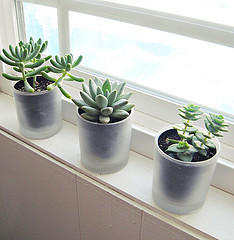Nothing can add flavor to a dish quite like fresh herbs, but constantly buying them from the market can become costly. One budget-friendly alternative is to grow your own herbs at home. It's relatively easy to do, even for those of us not exactly blessed with green thumbs! Here are a few pointers for growing an indoor herb garden:
1) Start with the right herbs.
Mint, chives, thyme, rosemary, and oregano are the best herbs for beginners. Not only are they easy to care for, they're diversified enough to add something unique to a range of dishes. If your garden will be perched upon a windowsill, then opt for herbs in four-inch pots.
2) Find a sunny spot.
Herbs need at least six hours of bright sunlight per day, which is why many herb gardeners choose a windowsill to host their garden. If your herbs become "leggy," a term that describes herbs with long stems and few leaves, then your plant needs more light. Be sure to rotate your plants every so often to expose all parts of the herb to sunlight.
3) Don't over-water.
Establishing a watering schedule will require a little bit of trial and error. One fool-proof way to see if your herbs need water is to stick your finger about 1 1/2 inches into the soil. If the soil feels damp, then your plant isn't in need of a drink just yet.
Tips on Starting an Indoor Herb Garden [Style Me Pretty Living]
Grow Herbs Indoors This Winter [Better Homes and Gardens]
How to Grow Your Own Indoor Culinary Herb Garden [Simple Bites]
Tips for Growing Herbs Indoors [The Herb Gardener]


 Equal Housing Opportunity
Equal Housing Opportunity